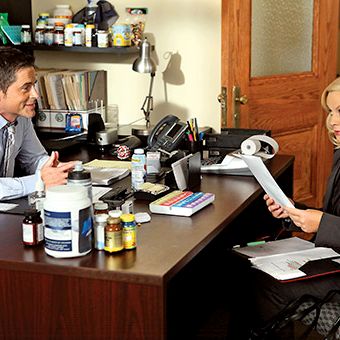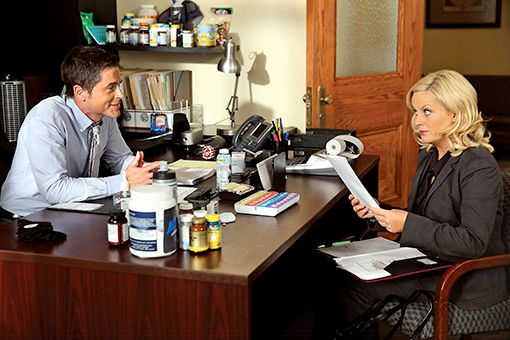

ThereÔÇÖs a feeling familiar to anyone who watches the NBC Thursday night comedy line up: discomfort. A Michael Scott, Liz Lemon, Dwight Schrute, Jenna Maroney, or a Pierce Hawthorne does something mortifying and you laugh, you grimace, maybe you hide your face in a pillow, and maybe, sometimes, if the going gets really humiliating, you fast forward just to confirm what you already know ÔÇö that everything will work out ÔÇö before rewinding to watch the debacle with equanimity. (What? You donÔÇÖt do that?) This comedy of discomfort, still in its most perfect form in the British version of The Office, is such a staple of the Thursday night sitcom experience (and WednesdayÔÇÖs too: Modern FamilyÔÇÖs Claire has been caught by her father wearing lingerie in public) that when things start to go haywire on Parks and Recreation, sometimes we instinctively reach for a pillow, even though Parks no longer causes cringing. It has abandoned mining the uncomfortable for laughs, in order to explore the comedic potential of super nice people.
If deep down inside, under the endemic disgruntlement of The Office or endemic egomania of 30 Rock, most sitcom characters are ÔÇ£good people,ÔÇØ on Parks thereÔÇÖs no deep down inside about it. Has a sitcom ever had so many characters that are variations on ÔÇØsweet, kind person?ÔÇØ The driven sweet, kind Leslie; the goofy sweet, kind Andy; the grounded sweet, kind Ann; the guarded sweet, kind Ben; and Ron, whose mustache only hides the sweet, kind guy lurking underneath. Even the romance between Andy and April is a story about the power of niceness. In the words of ParksÔÇÖs showrunner Michael Schur, April is a young woman who ÔÇ£feels out of place in this town; her friends are all ironic and hip and sour.ÔÇØ But she learns ÔÇ£You donÔÇÖt have to be bitter and sad all the time about your place in life,ÔÇØ thanks to Andy, ÔÇ£this big happy golden retriever who is just very full of love and joy.ÔÇØ
If championing good old fashion niceness makes Parks a throwback to a simpler sitcom era, it hasnÔÇÖt made it any less funny. (And Parks isnÔÇÖt alone: As Adam Sternbergh pointed out in his profile of Jimmy Fallon, the late night host is doing his part to demonstrate thereÔÇÖs comedy in sweetness.) Parks is one of the best reasons to think that The Office just might be able to thrive without Michael Scott (though, Will Arnett is a pretty good reason too). The discomfiting leading man (or woman) may be in style, but there are gentler ways to be hilarious.
Late last season, the nicest guy of all joined this feel good ensemble. Chris (Rob Lowe) is a singular sitcom creation, one who could only exist in ParksÔÇÖ universe of positivity. Chris is a perfect, perfect looking, supremely enthusiastic eternal optimist who compulsively exercises and doesnÔÇÖt seem to know any synonyms for the word ÔÇ£bad.ÔÇØ In real life, Chris would be insufferable. What a nightmare to run into this guy on a Monday morning! He hates negativity so much, he leaves the dirty work of budget cutting to his second-in-command. But as imagined by the Parks writers, ChrisÔÇÖs motives are pure: He is genuinely trying to be his best self and is closer than most to achieving this goal. HeÔÇÖs so perfect heÔÇÖs a weirdo, and, thus, funny. ItÔÇÖs hard to imagine a sitcom with even a marginally more cynical outlook ÔÇö so any other sitcom ÔÇö committing to the basic premise that such a flawless man could exist.
If championing good old fashion niceness makes Parks a throwback to a simpler sitcom era, it hasnÔÇÖt made it any less funny. (And Parks isnÔÇÖt alone: As Adam Sternbergh pointed out in his profile of Jimmy Fallon, the late night host is doing his part to demonstrate thereÔÇÖs comedy in sweetness.) Parks is one of the best reasons to think that The Office just might be able to thrive without Michael Scott (though, Will Arnett is a pretty good reason too). The discomfiting leading man (or woman) may be in style, but there are gentler ways to be hilarious.

